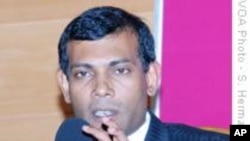The leader of the country perhaps most threatened by climate change is calling for India to take a leading role at an upcoming crucial global summit on the topic.
The President of the Maldives, an island nation threatened by rising ocean levels, is expressing hope its neighbor, India, can help bring about an international agreement to mitigate the effects of carbon emissions.
President Mohamed Nasheed has been giving speeches in the Indian capital ahead of the United Nations' climate change convention in December. He says India, taking its place as a world power, should lead other nations in renewable energy.
The Copenhagen talks are seen as crucial for achieving binding agreements on limiting greenhouse gas emissions. Many experts argue immediate action is needed to prevent catastrophic environmental damage.
President Nasheed says the possibility of his Indian Ocean nation of low-lying atolls vanishing under the sea this century must be viewed as a global concern.
"If you actually think this is a Maldives issue you cannot be so wrong as that," he said. "This is not a Maldives issue. The Maldives simply is in the front line. From the front line we're trying to tell the others that if this is happening to the Maldives today it's going to happen to you tomorrow."
Mr. Nasheed makes an analogy to Poland once being on the front lines of Nazi aggression. Speaking here Friday, he warned that if the U.N. climate summit does not take substantive action it will be like British Prime Minister Neville Chamberlain's weak peace treaty signed by Adolf Hitler in 1938, which was seen as appeasement to Germany, which failed to prevent a world war.
India's chief climate negotiator, Shyam Saran, says because climate negotiations are viewed as adversarial encounters - akin to security or trade talks - reaching a mutually-beneficial solution is jeopardized.
Former Foreign Secretary Saran, sitting beside the Maldives President, told a concerned audience in New Delhi that the upcoming climate change summit should not be viewed as a North-South clash between industrialized and developing nations.
"It is not as bad as you think that we are sort of divided in two camps," he said. "After all if we were, we would not be sitting across the table and negotiating. We are all trying together to find solutions."
India and China, on Wednesday, announced plans to cooperate at the talks in Copenhagen. Despite their regional rivalries in other areas, the two neighboring giants are expected to jointly oppose carbon-emission limits proposed by industrialized nations.
India's Prime Minister, Manmohan Singh, at a related conference Thursday reiterated that New Delhi wants an environmental pact that sets emission limits for nations on a per capita basis.
A 1997 treaty, the Kyoto Protocol, which set reduction targets for a limited number of countries, expires in three years.




